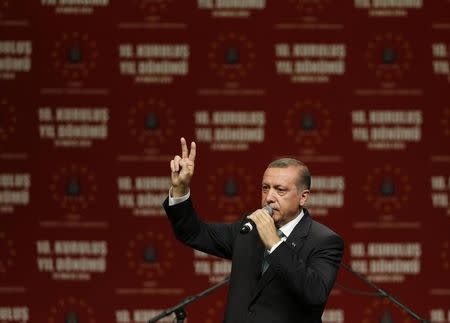Courting Kurdish vote, Turkey's Erdogan warns against sabotaging peace

By Seyhmus Cakan DIYARBAKIR Turkey (Reuters) - Kurdish demonstrators have blocked a highway in southeast Turkey and seized a soldier in protest at the building of military outposts, exposing the fragility of a peace process which Prime Minister Tayyip Erdogan hopes may help him win the presidency. Erdogan launched a peace process with Kurdish militant leader Abdullah Ocalan in 2012 to try to end a three-decade insurgency which has killed 40,000 people, a move long unthinkable in the face of strong nationalist opposition. Erdogan is widely expected to run in Turkey's first direct presidential election in August and support from its Kurdish minority, which accounts for around a fifth of the population, could be key to his chances of success. He would need a simple majority to win in the first round. His ruling AK Party secured support of around 45 percent nationwide in municipal elections at the end of March, suggesting every vote will count. "You have stuck up for the peace process. I believe you will not allow the process to be sabotaged," Erdogan told thousands of his AK Party supporters in the eastern and predominantly Kurdish province of Agri, near the Iranian border, on Wednesday. "Those who feed on blood and chaos will try and spoil the process." Kurdistan Workers Party (PKK) militants abducted the army sergeant on Tuesday after setting fire to his car at a roadblock they built between Diyarbakir and Bingol provinces, prompting a military operation to rescue him, security sources said. The militants have blocked various points along the highway with trucks and cars seized over the past four days in protest at the construction of several new military outposts, used by the armed forces to maintain tight security in the region. Security forces briefly reopened the road on Tuesday evening after sporadic clashes, but had to close it again as the protesters used excavators to dig parts of it up. The PKK took up arms against Turkey in 1984 with the aim of carving out a separate state in the southeast for the country's Kurds, which make up around 20 percent of the population but have long been denied basic political and cultural rights. Erdogan has staked considerable political capital in peace efforts, widening cultural and language rights at the risk of alienating parts of his grass roots support base. The PKK is designated a terrorist group by Ankara, the United States and European Union and Ocalan remains widely reviled among Turks. A ceasefire called by the militant leader in March 2013 has largely held, but the PKK halted a rebel withdrawal to bases in northern Iraq last summer, complaining at a lack of progress in the process. There has been sporadic violence in recent months. MOTHERS PROTEST In the main regional city of Diyarbakir, some 16 families have joined a 10-day sit-down protest against the PKK recruiting their children, highlighting the continued insecurity. Two 15-year-old cousins are among youths recruited by the group, according to local media reports. "We want peace right now. My child has been in the mountains for 40 days," one mother, Filiz Mahfuze Eren, told reporters after meeting the leader of the main Kurdish party in the region, who pledged to talk with the militants about the youths. "My hand is on my heart whenever a warplane takes off. The hand of the pilot's mother is also on her heart. It makes no difference whether Turk or Kurd, we want peace right now." Erdogan seized on the protests in his speech in Agri, where a local election is due to be re-run on Sunday, calling for the main Kurdish BDP/HDP party to secure the youths' release, sentiments likely to resonate with many in the region. "I made a call to the BDP/HDP: You will go and bring back those children ... If (the militants) do not hand them over, we as the government will implement our plan B and plan C," he said, without specifying what those plans were. The BDP, which has formed a recent alliance with the fellow opposition HDP party, shares the same grassroots support as the PKK but denied any involvement in youths joining the militant group and said the government was behind the protest. "The AKP government has provoked families of those joining the guerrillas and tried to turn the situation to their advantage with a few provocateurs," the BDP's local branch said in a statement. "These dirty plans will not work." The PKK itself said allegations of it kidnapping youths were part of a psychological war being waged by the Turkish state and that a recent surge in the numbers of youths joining its ranks was due to frustration with the peace process. "Turkey's psychological war office is using some families to slow down the rate of Kurdistan youth joining," its armed wing said in a statement. "This scenario developed by the AKP with the support of intelligence services will achieve nothing." Government officials said they were optimistic that the strains would not derail the peace process. "We see incidents of people being kidnapped and vehicles being damaged. These are not in harmony with the spirit of the (peace) process but they will be overcome," an official at the prime minister's office told Reuters. (Additional reporting by Orhan Coskun in Ankara; Writing by Daren Butler; Editing by Nick Tattersall and Alison Williams)

